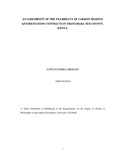| dc.description.abstract | ABSTRACT
Carbon afforestation projects on marginal and degraded agricultural lands could potentially
contribute to improved livelihoods to farmers through enhanced financial inflows from
carbon revenue and sale of tree products while restoring and conserving the environment.
Currently though, there is paucity in knowledge on the viability of these projects in Kenya.
This study was carried out in Trans Mara sub-County to explore the feasibility for carbon
trading afforestation projects among farmers. The specific objectives were to (i) evaluate
farmers’ willingness to participate in carbon trading contracts, (ii) their preferences for
different features of the contracts, (iii) the influence of farmer socioeconomic
characteristics on the likelihood of participation and (iv) willingness to accept (WTA), (iv)
assess the potential financial benefits derivable from carbon trading afforestation contract,
(v) assess farmers’ perceptions of climate variability and change and (vi) their adaptation
strategies.
The choice experiment method was used to design hypothetical carbon afforestation
contracts that were presented to the farmers to elicit their responses. The random parameter
logit models were employed to estimate farmers’ willingness to participate, preferences,
determinants of participation and WTA. The partial budget method, net present value and
benefit cost ratio were used to analyze the financial profitability of the carbon contracts.
The analysis of farmers’ perception of, and adaptation strategies to climate variability and
change was based on farmers’ observations of climatic events over a period of the past 20
years. Data was collected from a random sample of 206 farmers in Lolgorian and Kilgoris
Divisions using a semi-structured questionnaire.
The results showed that seventy nine percent of farmers would participate in carbon trading
afforestation contracts. Farmers preferred shorter contracts and those without an option for
cancellation, and were willing to trade-off less desirable features of the contracts with
additional payments. Farmer’s age and size of land holding positively influenced the
likelihood of participation in the carbon contracts. The average minimum amount of money
that the farmers would be willing to accept in order to set aside an acre of land for the
carbon contracts was KShs 3,591 per acre per year
xv
A carbon trading afforestation enterprise for the multiple objectives of timber and carbon
sequestration was found to be more profitable financially than the maize, beans and
livestock enterprises. The tree enterprise for a management objective of carbon
sequestration only was financially unprofitable at the prevailing carbon price of Kshs 860
Mg Cha-1year-1.The farmers had reasonable perceptions of the effects of climate variability
and change and had taken steps to adjust their farming activities. Changes in rainfall pattern
and intensity, variously described as unpredictable, delayed onset of rain, brief and intense
rainfall and insufficient rainfall, were the key ways in which the changes in climate were
perceived. The farmers made several adjustments to their farming practices that included
change of crop varieties and livestock breeds, reduction in herd size, and farm enterprise
diversification. Inadequate financial resources, information and labor were cited as the main
constraints to the adoption of adaptation strategies to combat climate change.
The study shows that carbon trading afforestation contracts are a feasible income earning
opportunity for farmers in Trans Mara sub-County particularly among those seeking for
opportunities to diversify their agricultural enterprises and those with underutilized lands.
Policy and development agents at the local level would do well to link the farmers to
existing carbon markets. A policy environment that enables the necessary institutional
mechanisms for community participation would be needed for the carbon trading
afforestation contracts to work. For them to have a wider appeal, carbon trading contracts
should be designed in a manner that accounts for heterogeneity in farmers’ resource
endowments, size of farm and preferences.
1 | |

